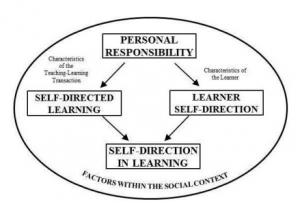Adult learners are defined as aged 25+ and are self-directed in their learning based on the life experiences that they bring to the classroom (Deggs, 2011)
Managers and business executives expect 21st century workers to be self-directed and to possess information literacy skills in order to succeed (Guglielmino & Murdick, 1997)
Since the early 1970s, self-directed learning (SDL) has materialized into leading areas of study and practice in adult education. To meet the challenges of various educational fields and careers, self-directed learning has become so crucial that many institutions have made it a part of their curriculum. Higher education is focusing on how to develop skills of inquiry in adult learners, as well as show them ways in which they can acquire knowledge in a more skillful way in order to promote life long learning and open doors to various opportunities.
Learning Activity:
- Read: ” Modeling spaces for self-directed learning at university courses” http://ifets.info/journals/12_3/4.pdf
- On the class forum, discuss the following questions with your peers:
- What exactly is the learning niche for self-directed learners who utilize social software?
- Do you think the niche descriptions can be used when developing a course design? How so?

